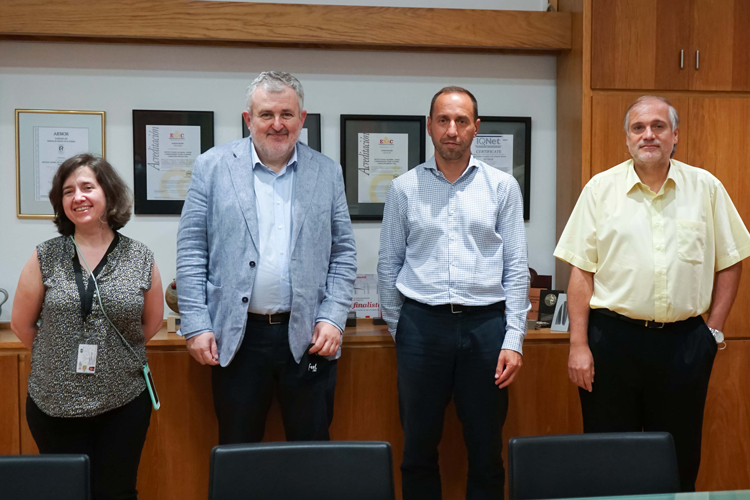IQS y PerkinElmer acuerdan la realización de un Doctorado Industrial para determinar las capacidades de las nuevas técnicas analíticas Single Particle ICP-MS y Single Cell ICP-MS en el estudio de tratamientos nanoteragnósticos.

Dr Ariadna Verdaguer, Dr Salvador Borrós, Mr Jorge Puente, and Dr Jordi Abellà after signing the agreement.
IQS (Ramon Llull University) and PerkinElmer have recently signed a partnership agreement to offer a new Industrial Doctorate (ID) as part of the Government of Catalonia's Industrial Doctorate Plan , co-financed between the company and the university. This new ID forms part of the partnership agreement signed by PerkinElmer and IQS in 2012, although collaboration between the company and the university goes back many years.
Led by Dr Ariadna Verdaguer and Dr Jordi Abellà, both of whom are researchers with the Department of Applied Analytical Chemistry at the IQS School of Engineering, the objective of the new thesis project is to determine the capacity of Single Particle ICP-MS techniques (SP-ICP-MS) and Single Cell ICP-MS (SC-ICP-MS) in the study of nanotheranostic treatments.
In recent years, the evolution of ICP-MS has led to the development of these two techniques (SP-ICP-MS and SC-ICP-MS). The first, single particle, enables the characterization of nanoparticles (NPs), while the second, single cell, makes it possible to determine both the elemental concentration and the distribution of the NPs at the individual cell level.
Applications of SP and SC ICP-MS techniques
Due to these characteristics, both techniques can be applied in fields as diverse as the environment, food, health, cosmetics, and more in which nanotechnology is increasingly present.
Within these fields of application is nanotheranostics, or the combination of therapy and diagnosis in a single system using the benefits offered by nanotechnology. The measurement of nanomaterials and the high surface/volume ratio they present facilitate, in many cases, the absorption of these diagnostic-therapeutic agents which can be released at specific points to carry out the corresponding therapy. The ability to penetrate tissues and the retention of NPs in the biological system are both critical factors when evaluating the efficacy of treatments. Therefore, both the characterization of the NP suspensions and their interactions with cells are very important.
In the new ID, both advanced analytical techniques will be evaluated in the study of new nanotheranostic treatments, yet another example of applied research and technology transfer between IQS and the business world.
“PerkinElmer seeks a safer world with healthier food where we can preventively detect diseases and treat them more effectively. Partnering with IQS for the Industrial Doctorate represents an important advance for us to improve the use of nanotechnology in diagnostics and therapies thanks to the characterization of nanoparticles and the elements present in them using advanced SP and SC ICP-MS techniques. The use of these techniques will help increase the level of knowledge about these processes and apply them to the improvement of treatments to fight against diseases."
New latest-generation ICP-MS
To further these research activities and enhance technology transfer, IQS has purchased a new NexION 5000 Multi Quadrupole ICP-MS device from PerkinElmer. It is the most advanced device currently on the market for this analytical technique and incorporates a fourth quadrupole that significantly improves sensitivity while eliminating many of the spectral interferences and unwanted ions that make it challenging to obtain satisfactory results.










